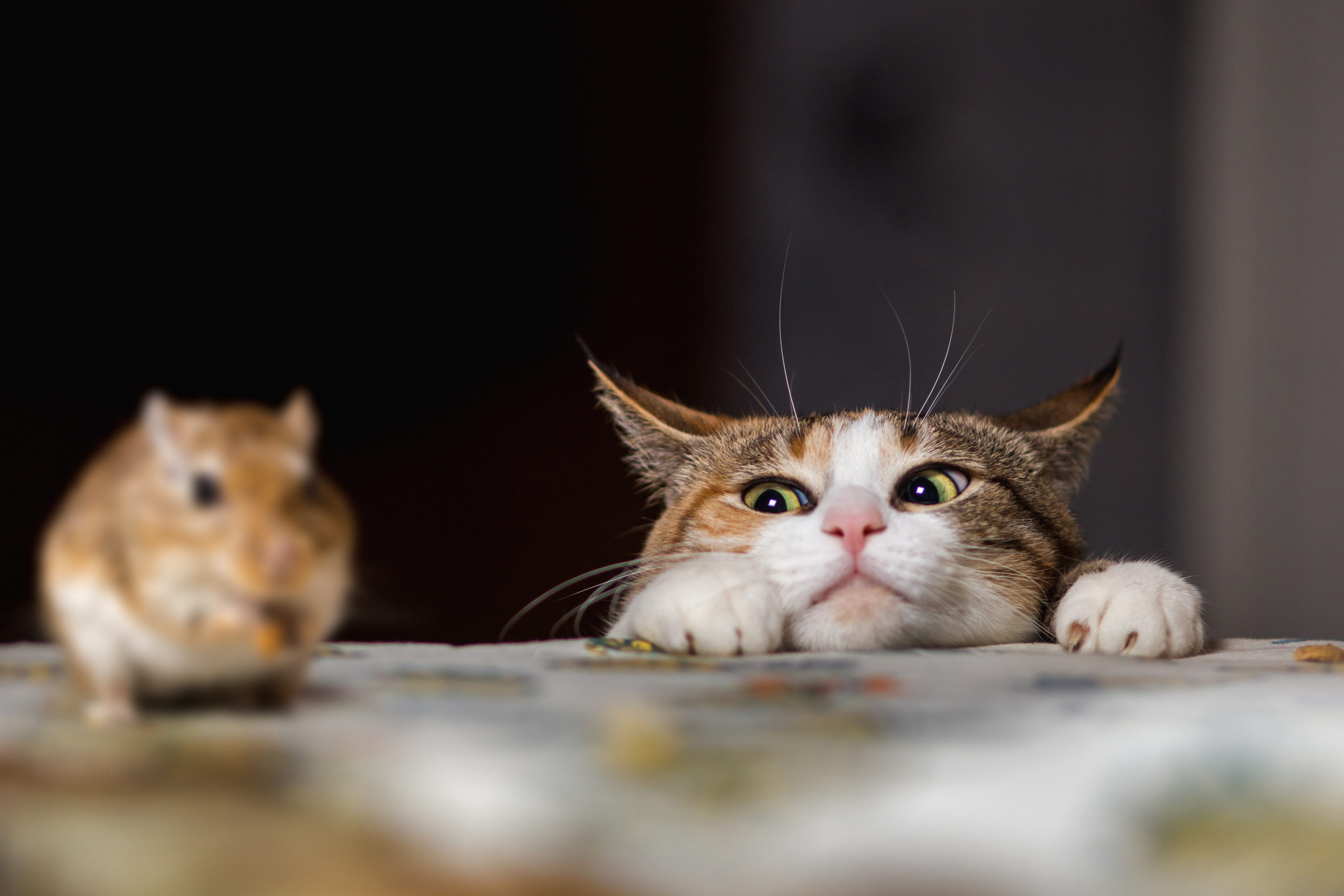7 Myths About Pest Control & Common Pests
7 Myths About Pest Control & Common Pests
In all of the years that pest control has been around, there have been quite a few myths surrounding the processes and pests. Old wives tales and rumors abound when talking about things that scare or disturb us, like the idea of insects or rodents invading our homes and yards. Let’s look at some of the most common myths and tall tales that run rampant in our culture.
Cheese is a Rodent’s Favorite Food

This is a classic. Picture any cartoon or comic with a rat or mouse in it, and it’s almost guaranteed that there will be cheese in the vicinity. It’s unknown why this myth began, but it’s likely because rodents will eat just about anything they can find. This is why they make nests in or around homes; houses have reliable good food that rodents can access when they stick around long enough. But mice and rats don’t love cheese in particular, and it isn’t even really in their top favorite foods.
The best bait for traps is either sugary or good for making nests. Rodents love sugar, so foods like peanut butter, cookies, cereal, and apples make great substances for traps. Anything that they would likely use to make a nest, like scraps of blankets and old rags, are also effective since they constantly look for materials to make the best nests for their families. But traps aren’t always enough to take care of a rodent infestation since they multiply so quickly, so contact pest control if you have a rodent problem.
Pests Only Infest Dirty Homes and Beds

Another stereotype from entertainment is that pests love mess and therefore only invade cluttered, dirty homes, hotels, and businesses. But unfortunately, this is not the case. Rodents, bed bugs, and cockroaches are definitely drawn to more disorganized spaces because it provides great hiding places and reliable food in various forms. It also usually takes longer to find the source of the problem in a disorganized space because there are so many other materials in the way. Many types of pests are drawn to moisture and warmth, which is found in both clean and cluttered homes. Also, some pests work when we aren’t aware. Bed bugs and rodents are nocturnal, so they go out to feed when most of us are asleep and we don’t notice them until it’s too late. Bed bugs only go where there is blood (gross!), so that’s why they can find their way into any kind of bed or upholstery that is consistently used by warm-blooded mammals.
Infestations can happen in any season as well, since pests like to invade when it’s too hot or too cold outside. There is no off season for potential problems, even in the typical “dead” season of winter. If you have an infestation of any size, take comfort in the fact that it doesn’t necessarily mean that you have a dirty home. You just have a nice place that pests liked enough to make it their home too!
Cats and Dogs are the Best Natural Pest Control

Many older people, especially those who live in more rural settings, like to say that the best type of pest control are our beloved pet cats and dogs. They are descendants of some of the best natural hunters of the animal kingdom, so it makes sense why they are still considered to be great hunters of smaller creatures. And domestic cats and dogs do have hunter instincts that are shown when an uninvited guest enters the yard, be it a bird, rat, possum, or even another pet that doesn’t live in your home.
While many cats and dogs do catch some pests in the yard or field, they don’t do it frequently enough to be a reliable form of pest control. A dog catching a rat is great and takes care of that specific problem, but we can’t – and shouldn’t – expect them to catch every rodent that enters the yard. Cats actually only catch mice when they’re in a more playful mood, so that isn’t reliable either. If either pet were to chase a rodent without catching it, the pest will likely run and hide. This means more problems for you, since a rodent in the wall or in a vent is worse than one out in the open due to the lack of access. Plus, neither common pet would solve an insect infestation, like ants or bed bugs. So a professional pest control service is necessary in the long run to eradicate the pest problems at the source and give your pets the day off from hunting their prey.
You Don’t Need Pest Control if There Aren’t Any Pests

This goes along with that classic saying “if it ain’t broke, don’t fix it.” It makes sense that if you don’t see any pests in your home, you don’t need pest control, right? Wrong. No home or business is invincible against pests, no matter what season or location it is in. Hidden pests, like termites and carpenter ants, can cause thousands of dollars in damage to a home if they are there long enough. Many pests bring diseases and bacteria on their body and feet, which is dangerous for your family. Cockroaches are known to cause a spike in allergies and asthma with the harmful scents and particles on their shells. As an added frustration, pests love to hide in boxes that remain untouched by us for a while, like if they are kept in the garage or attic.
You don’t need the same level of treatment as a place with a massive ant infestation, but there is still something to be said about preventative maintenance and inspections. If you know your neighborhood is prone to a specific type of pest around this time of year, there is no harm in calling pest control and learning about the options for preventative treatments. You can also do some simple tasks around the house to cut down on the attractions for pests, like crumbs, opened food, and piles of dirty laundry. It’s not good or healthy to live in fear of an infestation, but taking some precautions can certainly help in the long run.
Fleas Only Live on Dogs

Just about every commercial and advertisement for the leading brands of flea medicine show a cute dog furiously scratching at its ear, only to be helped by the “best” medicine that just happens to be the one in the commercial. While dogs seem to be the leading favorite of fleas, they aren’t the only ones who can host these annoying pests. Fleas love any warm-blooded mammal, so dogs, cats, humans, bears, foxes, and rats can all get fleas. They can even live on birds, since the feathers provide space for the fleas to hide and reproduce as they feed. Fleas can also be found in carpets or bedding, since those are great hiding places that are likely to have a mammal in the area for feeding. But you will definitely know if your home has fleas based on the constant scratching of your pet or the appearance of small, red, irritated bites on you.
Even if you manage to eradicate the fleas from your pet or yourself, it doesn’t necessarily mean they are gone from the area. Fleas can survive in a variety of environments, except for extreme heat, so they can live in your yard for quite a while before finding a reliable host to live on. If you know fleas have been pestering members of your home, pest control is a good idea to make sure the pests are completely gone. There are eco-friendly treatments available to make sure that there aren’t any more fleas on your pets, family, home, or yard.
DIY Solutions are Great Solutions for Infestations

If you were to search online for DIY pest solutions, there would be a million and one results about all of the ways to combat pests using objects already in your house. The essential oil craze has brought on a slew of solutions that use these concentrated oils, including pest control. Bay leaves, baking soda, lemons, boiling water, and many other common items are also often advertised as completely effective against the most frustrating of pests. These materials do have an effect on pests, and can prevent their return in small instances, but they should not be seen as the “end-all, be-all” of pest control. These are temporary solutions that can eliminate a few of the specific pests, but they won’t get to the root of the problem. Even traps and glue boards that you can buy at any hardware store won’t dissolve an infestation or prevent pests from ever getting past these barriers.
Homemade or DIY solutions can even cause more problems in the long run. If you keep glue boards right next to the big garage door, that’s helpful and a good idea, but it may cause smarter pests to find another entry point into the home or garage. Plus, DIY solutions often don’t get into the deeper hiding spots of pests. Many insects and rodents like to hide behind the wall, in vents, and in the tightest spaces that we could never reach normally. Professional services are the way to go when you have an infestation or know that a specific type of pest comes around your home every year. The equipment and treatments that pest control technicians are trained to use are made to get into all of the nooks and crannies that DIY solutions and mixtures cannot.
Wasp Repellent Takes Care of Wasp Infestations

Wasps are a common irritable pest because of the clear pain they inflict upon anyone unfortunate enough to disturb their nests. They don’t typically come inside the actual home or business, since all of their needs are met in the great outdoors. But for those of us who love being outside and enjoying whatever outdoor space we have, it’s frustrating to be plagued by buzzing insects that seem to enjoy stinging us. When left alone, wasps will not come after anyone minding their business far from the nest. But the presence of a wasp nest of any size isn’t ideal for a yard, especially if you have children or pets who are too curious for their own good. Wasp repellent that you can purchase from a store will kill a small number of wasps and save your outdoor party from becoming a pest party. It’s also a good idea to spray it where you know wasps like to build nests in your yard, if you already have the repellent on hand.
The best and most efficient way to treat a wasp infestation is to knock the nest down from where it is attached and treat the nest with insecticides, preferably eco-friendly. This is the most effective because it gets straight to the source of the wasp problem and makes the nest uninhabitable, so that no future wasps get excited to live in a move-in-ready home. Also, any smart wasp will stay far away from a spot that still has pesticide all over it. But please don’t try this method on your own! Knocking down a wasp nest without proper protection and equipment is a recipe for a painful experience that will leave you likely never wanting to hang out in your backyard again. Pest control technicians have all of the suitable protection and treatments to get the job done quickly and effectively. This is one pest problem that you definitely don’t want to test any DIY methods on.
Our Pest Control is Not a Myth
While all of these myths are still commonly believed in our culture, our pest control services aren’t fictional. Our trained and experienced technicians only use environmentally-friendly treatments, so you don’t have to worry about dangerous chemicals taking over your home. Researching the truth behind these myths are fun, but having pests in your home is not.
Citations
Hofve, Dr. J. (2022, March 16). Top ten flea myths for dogs & cats. Only Natural Pet. Available at https://www.onlynaturalpet.com/blogs/holistic-healthcare-library/top-ten-flea-myths (Accessed on April 7, 2022).

